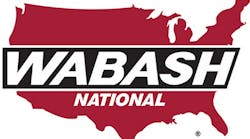The impending purchase of truck body maker Supreme Industries by trailer maker Wabash National Corp. for roughly $364 million – a deal analysts don’t expect to be held up by anti-trust concerns – is being characterized as a response to supply chain changes being wrought by rising e-commerce activity.
“This is only the beginning of the transformation we will see in the logistics and distribution model,” noted Wabash CEO Dick Giromini in a conference call with reporters. “Wabash intends to be at the forefront of that evolution in the transportation market. The addition of Supreme will help ensure that.”
He went on to characterize the deal as “a perfect marriage” and “a game changer,” and while the company emphasized the importance of responding to the supply chain demands of e-commerce, investment analysts suggest the real benefit to the purchase will be in greatly reducing Wabash’s dependence on the cyclical highway van trailer market.
“We believe that diversification away from dry van may be the bigger benefit to the shares over time,” noted Michael Baudendistel, vice president of the Stifel Transportation & Logistics Research Group, a division of Stifel Capital Markets, in a research brief filed after the call.
“The company is well capitalized, has been generating significant cash and should continue to do so near-term, and could use that cash flow productively to expand into businesses less cyclical than trailer manufacturing,” he added, noting that the transaction will lower the portion of Wabash revenue from dry van trailer manufacturing from 64% last year to an expected 50% in 2018. Wabash said its longer-term goal is to reduce the dry van revenue to 33%.
Wabash’s Giromini, however, said the key aspect of buying Supreme is helping advance its final mile strategy, accelerating growth and diversification, and providing attractive financial synergies.
In detailing these criteria, he explained that Wabash entered the final mile segment in 2015 with its truck body initiative and has been on track to meet its revenue goals—but Supreme will greatly accelerate the final mile push with additional distribution opportunities and “greater customer reach.”
Giromini characterized the growing consumer preference for home delivery as “the Amazon effect.”
“I would call [the Supreme acquisition] a perfect marriage,” Giromini said. “A marriage that creates a highly diversified player in the final mile arena, fully equipped to meet the needs of customers currently participating in the space, along with those who may enter in the future.”
“From our perspective, the deal makes a great deal of sense as it leverages the company’s capabilities, without creating additional exposure to its most cyclical segments, which we believe could ultimately help Wabash’s trading multiples,” Stifel’s Baudendistel added in his investor note. “Supreme is a productive manufacturer with, perhaps, some easily-realized cost takeout opportunities … [with] Wabash able to streamline Supreme by consolidating many back office expenses.”



